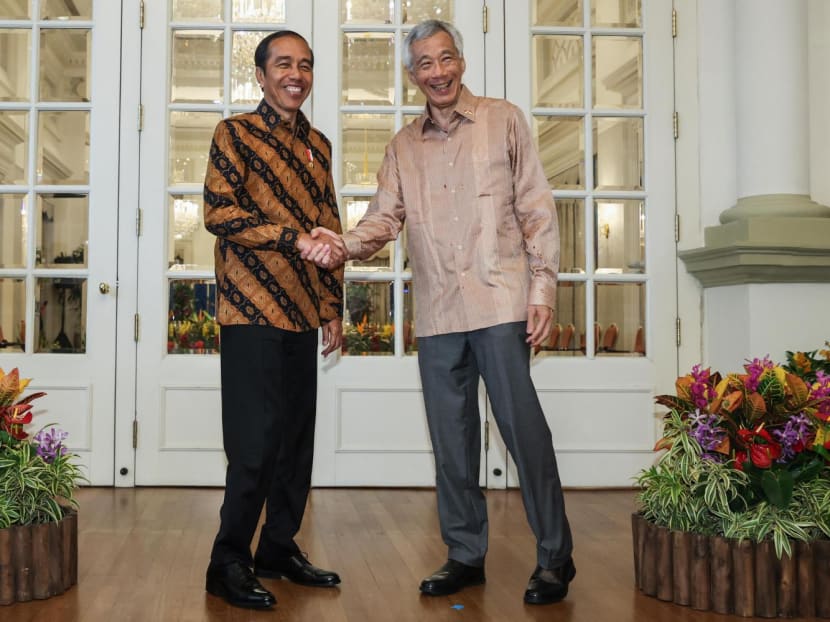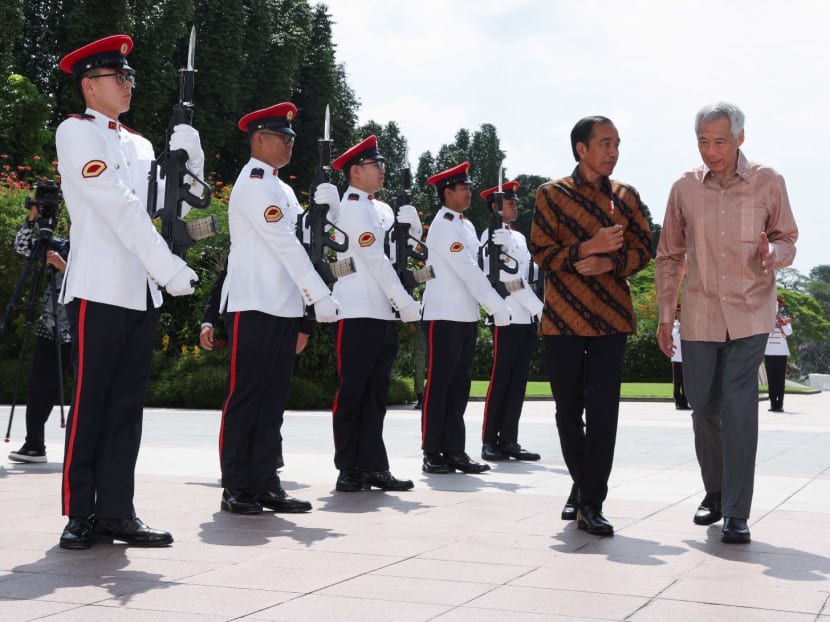Analysis: New areas of Singapore-Indonesia cooperation will help cement ties beyond Jokowi’s term
SINGAPORE — Singapore and Indonesia signed a slate of agreements that cover new areas of cooperation at a leaders’ retreat on Thursday (March 16), in a move that experts said would herald good bilateral ties beyond the end of Indonesian President Joko Widodo’s term in office next year.

Singapore's Prime Minister Lee Hsien Loong (right) shaking hands with Indonesia's President Joko Widodo (left) as they meet at the Istana in Singapore on March 16, 2023.
- Singapore and Indonesia signed six MOUs that included new areas of cooperation at a leaders' retreat
- Earlier in 2022, the two countries had signed three agreements that aimed to resolve longstanding bilateral issues such as extradition and defence cooperation
- On the new MOUs this round, political watchers said that the agreements will maintain good relations between the two nations beyond Indonesia’s next presidential election, which is due in February 2024
SINGAPORE — Singapore and Indonesia signed a slate of agreements that cover new areas of cooperation at a leaders’ retreat on Thursday (March 16), in a move that experts said would herald good bilateral ties beyond the end of Indonesian President Joko Widodo’s term in office next year.
The agreements would also help Mr Jokowi, as he is commonly known, to cement his legacy in both politics and economy, especially given that he “has always been a businessman”.
The experts were speaking to TODAY after the Singapore-Indonesia Leaders’ Retreat on Thursday at the Istana here.
At the retreat — the sixth one held between the two leaders — Prime Minister Lee Hsien Loong and Mr Jokowi witnessed the exchange of six memoranda of understanding (MOUs), which included promoting work exchanges for young professionals in the technology field, as well as cooperation in sustainable infrastructure development, and green and affordable public housing.
Mr Lee also gave updates on three agreements on air space, extradition and defence cooperation signed between the two nations last year that aim to resolve longstanding bilateral issues.
Singapore and Indonesia have also deepened cooperation in traditional areas, namely on security, health and finance cooperation, he added.
At a joint press conference, he said: “We are ready to break new ground in fresh areas of cooperation that are deep, multifaceted, forward-looking and mutually beneficial, and will make a difference to future generations.”
Mr Jokowi said that much progress has been accomplished since the leader's retreat last year, noting the ratification of the three agreements from that meeting, and pointing to Singapore's greater investment in Indonesia and the growing trade volume between the two nations.
THE NEW AREAS OF COOPERATION
The following are the memoranda of understanding (MOUs) on government-to-government cooperation signed and exchanged during a Singapore-Indonesia leaders’ retreat on Thursday (March 16):
- MOU to establish the Singapore-Indonesia Tech:X Programme, which enables tech professionals below the age of 30 to work and gain exposure in each other’s countries for up to a year
- MOU on Renewable Energy Cooperation, that will facilitate investments in the development of renewable energy manufacturing industries in Indonesia, and cross-border electricity trading projects between Indonesia and Singapore
- MOU on Sustainable Urban and Housing Development, which aims to facilitate the exchange of information and best practices in areas such as sustainable infrastructure development, green and affordable public housing as well as big data and analytics for development planning
- MOU between the Singapore Centre for Liveable Cities and the Indonesian Nusantara National Capital City Authority to enhance co-operation in areas such as integrated master planning and smart city development
- MOU on the Cooperation in the Field of Urban Search and Rescue, which reaffirms longstanding cooperation in emergency preparedness and disaster response, and explores new areas of growth and collaboration in this area
- An MOU on health cooperation, to promote exchange of information, knowledge, data and technology in the health sector
Commenting on the six MOUs signed, Dr Felix Tan from the Nanyang Technological University (NTU), whose research interests cover Southeast Asian politics, said that the agreements “would necessarily continue and extend the good relationships between Singapore and Indonesia”.
Mr Jokowi is reaching the end of his second and final term of presidency, with Indonesia due to hold a presidential election by next February.
Mr Dedi Dinarto, lead Indonesia analyst at public policy advisory firm Global Counsel, said that the expanded cooperation “represents both countries’ willingness to take one step forward” since the two neighbours have resolved how they should go about “the longstanding issues” around the air space, defence cooperation and extradition treaty.
He does not expect significant changes in the bilateral relationship between the two nations even after next February.
“Singapore remains the largest foreign investor in Indonesia, and this will keep Singapore a priority for the next administration,” he added.
Dr Mustafa Izzuddin, a senior international affairs analyst at consultancy firm Solaris Strategies Singapore, said: "The litmus test is the bilateral sustainability of the MOUs delivering on the stated outcomes of a post-Jokowi Indonesia due to domestic impediments."
However, he believed that both nations will continue enjoying "a symbiotically even-keeled relationship" in this decade, because the leaders of both countries recognise the benefits that can come from cooperating with each other.
Dr Tan from NTU also said that the MOUs will allow Mr Jokowi to leave behind a legacy that “clearly defines” his contribution to Indonesia’s growth on both the political and economic fronts.
“(President) Jokowi has always been a businessman and his efforts to build good relations with Singapore and other partners in this region will be the defining moment of his leadership. These MOUs will certainly help provide Indonesia with more opportunities that will last beyond his term as president,” he said.
On Thursday, Mr Lee said that besides cooperation between the governments, Indonesian and Singapore businesses have also signed several MOUs in areas of digital economy and healthcare, strengthening links that “form an important part of our deep, multi-layered and comprehensive partnership”.
One notable area that drew interest from the private sector, both leaders said, was the upcoming Nusantara Capital City, which was planned to replace Jakarta as Indonesia's capital.
During the joint press conference, Mr Jokowi announced that there were 20 letters of intent from private sector companies in Singapore expressing interest to invest in the project.
RESOLVING LONGSTANDING BILATERAL ISSUES
Mr Lee also said that Singapore and Indonesia have taken a major step forward to resolve three longstanding bilateral issues.
Both nations have jointly applied for approval from the International Civil Aviation Organisation (ICAO) for new arrangements under an agreement signed last year to realign the boundary between the Flight Information Region (FIR) controlled by Singapore and Jakarta.
The FIR agreement was one of three signed at the previous Singapore-Indonesia Leaders’ Retreat held in Bintan, Indonesia in January last year.
Two other agreements were to bring into force a 2007 defence cooperation agreement that had been put on hold previously, and to put in place an extradition treaty between the two nations.
Mr Lee said on Thursday that both Singapore and Indonesia have ratified the three agreements, and will agree on a date for the three to be implemented simultaneously after ICAO grants its approval for the FIR one.
Mr Lee said that the agreements will bring “lasting benefits to both sides”.
“The successful outcome reflects our strong bilateral relations, and shows that Singapore and Indonesia can gain substantial mutual benefits through open and constructive engagement,” he said.

In a statement on Thursday after the retreat, Singapore’s Ministry of Foreign Affairs (MFA) said that the leaders agreed that bilateral cooperation should “continue to be multi-faceted and comprehensive”.
Mr Lee thanked President Jokowi for his contributions to the bilateral relationship, and “both leaders reaffirmed their commitment to take relations to new heights”, the ministry added.
ASEAN AND REGIONAL ISSUES
MFA said that Mr Lee and Mr Jokowi also discussed Indonesia’s priorities for its chairmanship of the Association of Southeast Asian Nations (Asean).
“Both leaders exchanged views on the situation in Myanmar, and on the roadmap for Timor-Leste’s membership. Prime Minister Lee reiterated Singapore’s full support for Indonesia’s Asean chairmanship,” it added.
In his remarks in Bahasa Indonesia during the joint press conference at the Istana earlier in the day, Mr Jokowi expressed his thanks for Singapore's support and looked forward to Singapore's contribution at the upcoming Asean-Indo-Pacific Forum in September.
Mr Lee said that Singapore and Indonesia “regret the lack of progress” in Asean’s Five Point Consensus on the situation in Myanmar.
This consensus was issued by leaders of Asean member nations in April 2021 in the wake of a military coup in Myanmar that deposed democratically-elected leader Aung San Suu Kyi.
“Singapore will continue working with Indonesia and with Asean members, plus Asean’s partners like the United Nations to push for the full implementation of the Five Point Consensus,” Mr Lee said.
On the issue, Mr Jokowi said that while Indonesia chairs Asean this year, it will continue to push for the implementation of the Five Point Consensus, engage all parties to pave the way for inclusive national dialogues and continue to stress on the de-escalation of tension and violence.











